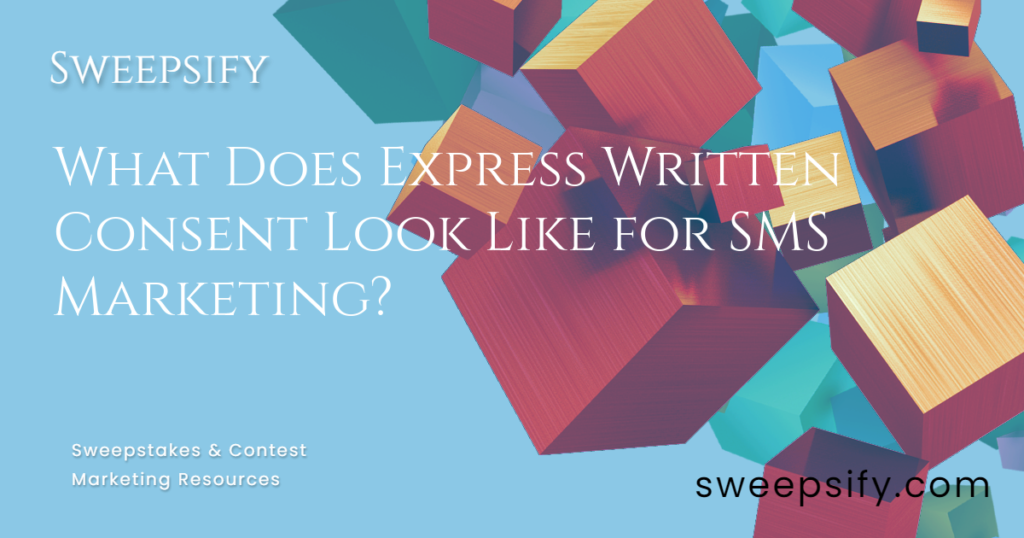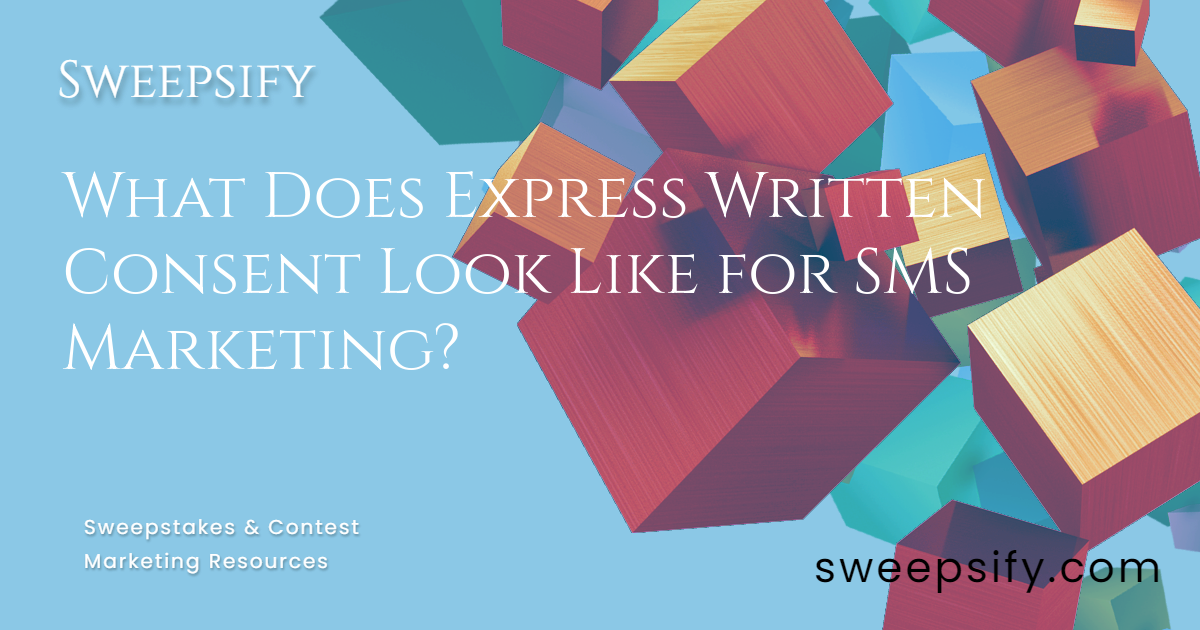Here is a list of our current affiliate partners and how we earn money
If you’re planning to run a text to win sweepstakes or giveaway, you need to obtain express written consent from your customers first. But what does express written consent look like when done electronically?
Here is what you need to know about express written consent to send text messages for marketing purposes.

What Is Express Consent For SMS Marketing?
Read this article now. Then save it for later. Tap on the button below to Download this article in PDF format. Please allow some time for the file to generate.
Article Contents

What Is Express Written Consent?
Express written consent is a written agreement that is authorized by the recipient of the text marketing messages.
It should include a clear and visible disclosure that explains to the consumer that they are authorizing a company to send them marketing communications via text message.
Under the Telephone Consumer Protection Act (TCPA), consumers must agree to receive SMS marketing messages from your company before you can send them.
You must also explain why you are sending the messages, what messages they can expect from you, and provide the terms and conditions and privacy policy for your marketing program.
Written does not mean that the consent has to be handwritten.
Instead, it simply refers to any type of permission that a business can document and keep on file, such as a text message reply or entry form submission.
via GIPHY
Why Do I Need Express Written Consent to Run a Text Sweepstakes?
If you plan to run a text sweepstakes, you need to obtain express written consent before sending any marketing messages to participants. This is federal law.
Express written consent is a part of the telecommunications regulations set forth by the TCPA. The TCPA is responsible for regulating how companies conduct SMS marketing in order to protect consumers from unwanted communications.
The Federal Communications Commission (FCC) is responsible for enforcing the TCPA. As a result, express written consent is required by federal law.
Businesses can face hefty penalties for failing to abide by this law including per message fines and willful violation fines. There is no cap on the damages that a company can face for sending text messages illegally.

How to Get Express Written Consent for a Text to Win?
Fortunately, it’s possible to get express written consent from consumers electronically. All you need to do is create an opt-in message for your campaign with the information as required per the TCPA.
By Text Message
An SMS marketing or sweepstakes company can assist you with creating TCPA-compliant mobile entry pages for your promotion.
As far as the opt-in message, it needs to include all of the following:
- The purpose of your campaign (to run a text sweepstakes)
- Message frequency
- Message and data rates may apply
- Link to your Official Rules (terms and conditions)
- Link to Your Privacy Policy
Don’t forget to explain how they can:
- opt-out by texting ‘STOP’
- get help by texting ‘HELP’
This will ensure that participants have all of the information they need to engage with your campaign.
By Web Entry Form
If a participant decides to enter your text to win via the web entry form instead of by text, you can also add the opt-in SMS message to your web entry form.
Then you will also obtain express written consent to send these participants text messages.

Use Double Opt-in to Confirm Express Written Consent for SMS Marketing
Express written consent is an important part of SMS compliance that could create a lot of headaches for your business if not done properly.
As a result, we recommend that you always use double opt-in if you obtain express written consent to send SMS marketing messages to a phone number via another channel, such as web entry form.
Free Ad Maker for Social Media and Video Advertising
Create awesome ads for your sweepstakes or contest in seconds with the Adobe Express free ad maker. Customize your advertising by including trending images, high impact fonts, and high quality design assets. Create your ads now.
ADVERTISEMENT
The TCPA requires that you send your text subscribers a message to confirm that they’ve opted-in to your SMS marketing program. This message should repeat the details of your SMS promotion that were stated at the time of opt-in.
You can simply ask participants to reply ‘YES’ if they agree to receive SMS messages to provide a double opt-in
By using double opt-in, you’ll be able to confirm that the participant indeed has access to the phone number they entered during the sign up process.
You’ll also remind your subscribers that they did in fact give you permission to send them text messages.
This will help to reduce your SMS unsubscribe rate and the chances of your marketing text messages being blocked as spam.
Express Written Consent and TCPA Frequently Asked Questions
Here are FAQ and answers about TCPA and SMS marketing:
If a Customer Already Gave Me Their Phone Number Can I Send Them Text Messages?
No, you have not specifically asked them to authorize your company sending them text messages. As a result, you will still need to obtain express written consent.
Does TCPA Require Opt-Out?
TCPA does not require express consent or opt-out instructions.
via GIPHY
Are Any Text Messages Exempted From TCPA?
TCPA applies to SMS marketing and advertising messages, autodialed and pre-recorded phone calls. However, some text messages are exempted from TCPA and do not require express written consent:
- Non-commercial messages
- Urgent or emergency updates
However, all marketing messages that are designed to sell or promote a product or service must follow TCPA rules.
As a result, all SMS related to text sweepstakes must follow TCPA regulations and require companies to obtain express written consent before sending any text messages.
Subscribe Now:
via GIPHY
SMS Compliance and Your Text to Win Sweepstakes: What to Do Next
Getting permission to send messages to customers is one of the most important aspects of making sure that your text sweepstakes is compliant with SMS marketing regulations.
Understand that opt-in SMS requirements don’t only help protect consumers from unsolicited messages and spam. They also lead to a higher engagement rate for campaign and the potential for your text marketing campaign to deliver on ROI.
Hire a text to win sweepstakes company to help you build your campaign and then you’ll have peace of mind knowing that your text message marketing is fully compliant with TCPA rules.
Looking for a text to win sweepstakes company to help you with your next promotion? Sweepsify helps you find top sweepstakes companies in seconds. Create your free Premium account now to get started.



